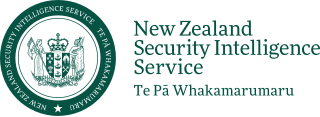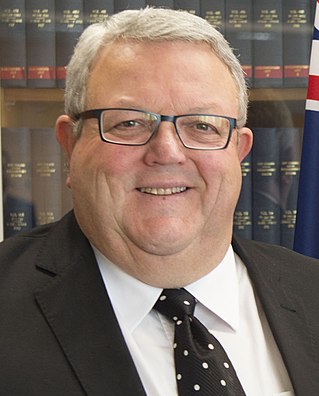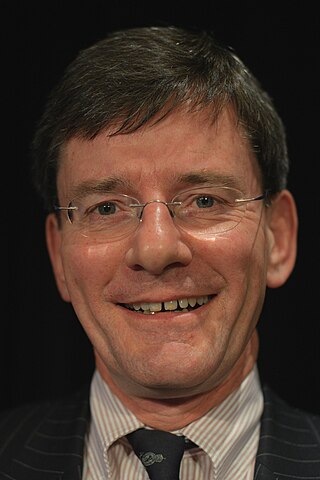Related Research Articles

The Supreme Court of New Zealand is the highest court and the court of last resort of New Zealand. It formally came into being on 1 January 2004 and sat for the first time on 1 July 2004. It replaced the right of appeal to the Judicial Committee of the Privy Council,based in London. It was created with the passing of the Supreme Court Act 2003,on 15 October 2003. At the time,the creation of the Supreme Court and the abolition of appeals to the Privy Council were controversial constitutional changes in New Zealand. The Supreme Court Act 2003 was repealed on 1 March 2017 and superseded by the Senior Courts Act 2016.

The New Zealand Security Intelligence Service is New Zealand's primary national intelligence agency. It is responsible for providing information and advising on matters including national security and foreign intelligence. It is headquartered in Wellington and overseen by a Director-General,the Minister of New Zealand Security Intelligence Service,and the parliamentary intelligence and security committee;independent oversight is provided by the Inspector-General of Intelligence and Security.

Gerard Anthony Brownlee is a New Zealand politician of the New Zealand National Party. He has been a Member of Parliament since 1996,was Leader of the House,Minister for Canterbury Earthquake Recovery and Minister of Foreign Affairs in the Fifth National Government,and served as his party's deputy leader from November 2003 until November 2006,and again from July until November 2020.

Keith James Locke is a former New Zealand member of parliament who represented the Green Party,being first elected to parliament in 1999 and retiring from parliament at the 2011 election.

The Government Communications Security Bureau is the public-service department of New Zealand charged with promoting New Zealand's national security by collecting and analysing information of an intelligence nature. The GCSB is considered to be New Zealand's most powerful intelligence agency,and has been alleged to have conducted more espionage and data collection than the country's primary intelligence agency,the less funded NZSIS. This has at times proven controversial,although the GCSB does not have the baggage of criticism attached to it for a perceived failure to be effective like the NZSIS does. The GCSB is considered an equivalent of GCHQ in the United Kingdom or the NSA in the United States.

Aotearoa Legalise Cannabis Party (ALCP),also known as the Cannabis Party,is a political party in New Zealand. It is dedicated to removing or reducing restrictions on the use of cannabis and similar substances.
Ahmed Zaoui is an Algerian member of the Islamic Salvation Front. He arrived in New Zealand on 4 December 2002 where he sought refugee status. Objections from the Security Intelligence Service were withdrawn in September 2007,allowing him to remain in New Zealand. He was granted New Zealand citizenship in 2014.

Wayne Daniel Mapp is a former New Zealand National Party politician. He was the Member of Parliament for North Shore from 1996 to 2011. In the first term of the Fifth National Government,he served as Minister of Defence. Prior to his political career Mapp was in the New Zealand Territorial Army and worked as a lawyer and university lecturer.

Christopher Francis Finlayson is a New Zealand lawyer and former Member of Parliament,representing the National Party.

The Inspector-General of Intelligence and Security (IGIS) is the official responsible for supervising New Zealand's two main intelligence agencies:the Security Intelligence Service (SIS) and the Government Communications Security Bureau (GCSB).

The High Court of New Zealand is the superior court of New Zealand. It has general jurisdiction and responsibility,under the Senior Courts Act 2016,as well as the High Court Rules 2016,for the administration of justice throughout New Zealand. There are 18 High Court locations throughout New Zealand,plus one stand-alone registry.
A security risk certificate is part of a New Zealand legal process whereby a person suspected of being a security risk can be incarcerated prior to expulsion from the country.
The New Zealand Refugee Status Appeals Authority or RSAA,was an independent authority that heard the appeals of people who had been declined refugee status by the Refugee Status Branch of the New Zealand Immigration Service. It was established in 1991,and was replaced by the Immigration and Protection Tribunal in 2010. New Zealand established the RSAA as part of its responsibility to uphold the right of asylum as a result of being a signatory of the 1951 Convention relating to the Status of Refugees and the 1967 Protocol. The decisions of the RSAA are not binding,but have had a significant impact on refugee jurisprudence.

The Roger Award For The Worst Transnational Corporation Operating in New Zealand was an annual media campaign run since 1997 by two activist organisations,Campaign Against Foreign Control of Aotearoa and GATT Watchdog. The winners were chosen by a group of academics,activists,businesspeople and trade unionists.
New Zealand's intelligence agencies and units have existed,with some interruption,since World War II. At present,New Zealand's intelligence community has approximately 550 employees,and has a combined budget of around NZ$145 million.

The Chief Justice of the Cook Islands is the head of the Cook Islands judiciary. They preside over the High Court of the Cook Islands and serve as a member of the Cook Islands Court of Appeal. The office was established by the Cook Islands Constitution.
The Human Rights Foundation of Aotearoa New Zealand is a non-governmental organisation in New Zealand,which seeks "to promote and defend human rights through research based education and advocacy."

Zaoui v Attorney-General was the final judicial decision concerning Algerian refugee Ahmed Zaoui before the objections of the Security Intelligence Service concerning Zaoui's alleged threat to national security were withdrawn in September 2007,allowing him to remain in New Zealand. The judgment of the Supreme Court of New Zealand was concerned with the proper interpretation of article 33 of the United Nations Convention Relating to the Status of Refugees 1951 and section 72 of the Immigration Act 1987.

Tafua Maluelue Tafua is a Samoan politician and former member of the Legislative Assembly of Samoa. He is a member of the Human Rights Protection Party.
Aziz Choudry,originally from New Zealand,was a scholar and Canadian activist and the former coordinator of GATT Watchdog,a Canadian non-governmental organization that monitored the activities of the World Trade Organization.
References
- 1 2 3 New Zealand Who's who Aotearoa. Alister Taylor Publishers & New Zealand Who's Who Publications. 2001. p. 392.
- 1 2 3 4 Wendy Murdoch (4 May 1996). "Time to move on from a life in law". Dominion-Post– via EBSCOHost.
- ↑ Anthony Hubbard (1 December 1996). "The man to keep an eye on our spies". Sunday Star-Times. p. C5 – via EBSCOHost.
- ↑ "APPOINTMENT OF COMMISSIONER OF SECURITY WARRANTS". New Zealand Government. 9 September 1999. Retrieved 1 July 2020.
- ↑ "Sir John Jeffries & Hon Laurence Greig reappointed". Scoop. 11 March 2003. Retrieved 12 February 2021.
- ↑ David Small and Aziz Choudry (13 June 2000). "Government Spy Agency Watchdog "complete waste of time and taxpayers' money" : Complainants call for abolition or radical overhaul". Peace Movement Aotearoa. Retrieved 1 July 2020.
- ↑ Gordon Campbell (28 November 2003). "Watching the watchers". New Zealand Listener. Archived from the original on 21 April 2020. Retrieved 1 July 2020.
- ↑ "Inspector-Gen. of Intelligence & Security resigns". Scoop. 31 March 2004. Retrieved 1 July 2020.
- ↑ Selwyn Manning (31 March 2004). "High Court Finds Greig Bias Against Zaoui Case". Scoop. Retrieved 1 July 2020.
- ↑ "Justice Neazor appointed Inspector-General of Intelligence and Security". New Zealand Government. 27 April 2004. Retrieved 1 July 2020.